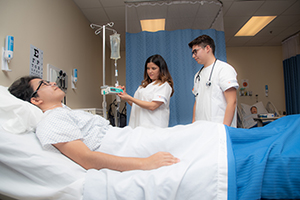
The nursing shortage in the Rio Grande Valley is prevalent, and with COVID-19, the demand has also exponentially increased around the state, but the Texas Southmost College Associate Degree in Nursing program is gearing up to welcome its third registered nursing cohort to meet this demand.
“Nurses are and always will be needed,” said Beth Kasprisin, TSC Associate Degree in Nursing program director. “Health care is one field where you know you will always be able to find a job. TSC is training the nurses of tomorrow and preparing them to fill the gap in our communities.”
Students in the accredited, two-year nursing program receive training in basic nursing foundations to critical care, in addition to extensive hands-on training in a state-of-the-art lab that resembles a hospital setting and includes lifelike simulation mannequins that represent real-world nursing scenarios.
The goal of the program is to produce well-rounded, highly skilled and compassionate nurses that will make patient care a top priority.
“Our students’ training goes from the classroom and the lab to a hospital setting. The experience they receive before graduating exposes them to the field before they even accept their first job,” said Kasprisin. “This allows them to train in a controlled, safe environment and gain the confidence they need in themselves and their skills.”
TSC ADN student Erika Cantu expects to graduate in December and said when she entered the program, nursing was brand new to her, but now because of her training, she is ready for life as a nurse.
“TSC’s nursing program has given me all of the tools and resources I need to learn the profession,” said Cantu. “The bar is set high for us, but with the support and knowledge from all of instructors and the hands-on training opportunities available to us, I have been able to push through no matter how demanding or challenging it has been.”
Cantu added that she knew from the start that she would find success in this program because of the program’s achievements. In fact, she has already received several job offers.
TSC’s ADN program holds a 90% board exam pass rate and a 100% job placement rate.
“The program’s success rate is one of the main reasons why I chose this particular nursing program,” she said. “The likelihood that I was going to succeed was high, and I was right. All of my dreams of becoming a nurse are now coming true.”
The average starting wage in the Rio Grande Valley for a nurse is $25 an hour, but can increase due to the nursing demand and could include stipends or sign-on bonuses.
Kasprisin said she expects to see enrollment in the nursing program increase and the goal remains steadfast – support the local nursing system by filling in workforce gaps with trained, well-rounded nurses who are passionate and dedicated to improving the health care of the Rio Grande Valley community.
To learn more about the application process, prerequisites and entrance exam, or to apply, call 956-295-3576.
